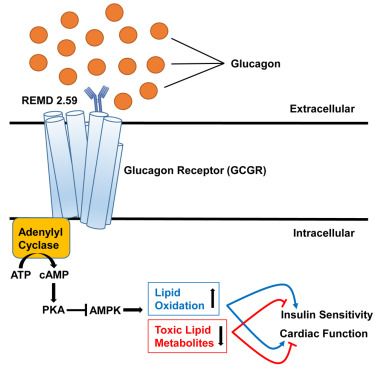Our official English website, www.x-mol.net, welcomes your
feedback! (Note: you will need to create a separate account there.)
Glucagon Receptor Antagonism Improves Glucose Metabolism and Cardiac Function by Promoting AMP-Mediated Protein Kinase in Diabetic Mice.
Cell Reports ( IF 7.5 ) Pub Date : 2018-Feb-13 , DOI: 10.1016/j.celrep.2018.01.065 Ankit X Sharma 1 , Ezekiel B Quittner-Strom 1 , Young Lee 2 , Joshua A Johnson 1 , Sarah A Martin 3 , Xinxin Yu 2 , Jianping Li 4 , John Lu 5 , Zheqing Cai 6 , Shiuhwei Chen 1 , May-Yun Wang 2 , Yiyi Zhang 1 , Mackenzie J Pearson 1 , Andie C Dorn 1 , Jeffrey G McDonald 7 , Ruth Gordillo 1 , Hai Yan 5 , Dung Thai 5 , Zhao V Wang 4 , Roger H Unger 2 , William L Holland 1
Cell Reports ( IF 7.5 ) Pub Date : 2018-Feb-13 , DOI: 10.1016/j.celrep.2018.01.065 Ankit X Sharma 1 , Ezekiel B Quittner-Strom 1 , Young Lee 2 , Joshua A Johnson 1 , Sarah A Martin 3 , Xinxin Yu 2 , Jianping Li 4 , John Lu 5 , Zheqing Cai 6 , Shiuhwei Chen 1 , May-Yun Wang 2 , Yiyi Zhang 1 , Mackenzie J Pearson 1 , Andie C Dorn 1 , Jeffrey G McDonald 7 , Ruth Gordillo 1 , Hai Yan 5 , Dung Thai 5 , Zhao V Wang 4 , Roger H Unger 2 , William L Holland 1
Affiliation

|
The antidiabetic potential of glucagon receptor antagonism presents an opportunity for use in an insulin-centric clinical environment. To investigate the metabolic effects of glucagon receptor antagonism in type 2 diabetes, we treated Leprdb/db and Lepob/ob mice with REMD 2.59, a human monoclonal antibody and competitive antagonist of the glucagon receptor. As expected, REMD 2.59 suppresses hepatic glucose production and improves glycemia. Surprisingly, it also enhances insulin action in both liver and skeletal muscle, coinciding with an increase in AMP-activated protein kinase (AMPK)-mediated lipid oxidation. Furthermore, weekly REMD 2.59 treatment over a period of months protects against diabetic cardiomyopathy. These functional improvements are not derived simply from correcting the systemic milieu; nondiabetic mice with cardiac-specific overexpression of lipoprotein lipase also show improvements in contractile function after REMD 2.59 treatment. These observations suggest that hyperglucagonemia enables lipotoxic conditions, allowing the development of insulin resistance and cardiac dysfunction during disease progression.
中文翻译:

胰高血糖素受体拮抗作用通过促进糖尿病小鼠中AMP介导的蛋白激酶来改善葡萄糖代谢和心脏功能。
胰高血糖素受体拮抗作用的抗糖尿病潜力为在以胰岛素为中心的临床环境中使用提供了机会。为了研究胰高血糖素受体拮抗作用在2型糖尿病中的代谢作用,我们用人单克隆抗体和胰高血糖素受体竞争性拮抗剂REMD 2.59治疗了Leprdb / db和Lepob / ob小鼠。如预期的那样,REMD 2.59抑制肝葡萄糖生成并改善血糖。出人意料的是,它还增强了肝脏和骨骼肌中的胰岛素作用,与AMP激活的蛋白激酶(AMPK)介导的脂质氧化的增加相吻合。此外,在数月内每周进行一次REMD 2.59治疗可预防糖尿病性心肌病。这些功能上的改进不是简单地从纠正系统环境中获得的;心脏特异性脂蛋白脂肪酶过表达的非糖尿病小鼠在REMD 2.59治疗后的收缩功能也有所改善。这些观察结果表明,高血糖素血症可引起脂毒性疾病,从而在疾病发展过程中引起胰岛素抵抗和心脏功能障碍的发展。
更新日期:2018-02-25
中文翻译:

胰高血糖素受体拮抗作用通过促进糖尿病小鼠中AMP介导的蛋白激酶来改善葡萄糖代谢和心脏功能。
胰高血糖素受体拮抗作用的抗糖尿病潜力为在以胰岛素为中心的临床环境中使用提供了机会。为了研究胰高血糖素受体拮抗作用在2型糖尿病中的代谢作用,我们用人单克隆抗体和胰高血糖素受体竞争性拮抗剂REMD 2.59治疗了Leprdb / db和Lepob / ob小鼠。如预期的那样,REMD 2.59抑制肝葡萄糖生成并改善血糖。出人意料的是,它还增强了肝脏和骨骼肌中的胰岛素作用,与AMP激活的蛋白激酶(AMPK)介导的脂质氧化的增加相吻合。此外,在数月内每周进行一次REMD 2.59治疗可预防糖尿病性心肌病。这些功能上的改进不是简单地从纠正系统环境中获得的;心脏特异性脂蛋白脂肪酶过表达的非糖尿病小鼠在REMD 2.59治疗后的收缩功能也有所改善。这些观察结果表明,高血糖素血症可引起脂毒性疾病,从而在疾病发展过程中引起胰岛素抵抗和心脏功能障碍的发展。





















































 京公网安备 11010802027423号
京公网安备 11010802027423号